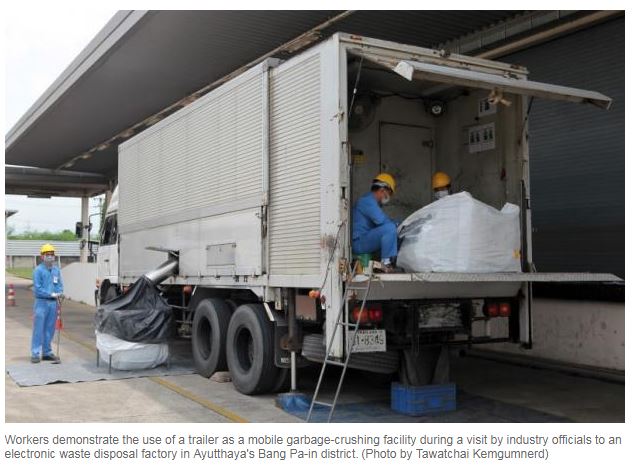Thailand: Department of Industrial Works mulls e-waste import ban
The Department of Industrial Works (DIW) is considering banning recycling factories from importing certain types of e-waste that have negative impacts on the environment and communities.
DIW and police last week carried out an inspection of 148 electronic waste recycling factories nationwide, including seven factories licensed to import electronic waste from abroad after several of them were found to be illegally importing and processing electronic waste.
DIW director general Mongkol Pruekwatana yesterday said the import of electronic waste into Thailand now can be done only with advance approval and under strict control from the authorities. He said all imports of electronic waste into Thailand must also be approved by authorities from the country of origin in accordance with the Basel Convention, adding that the import approval will only be granted to factories intending to use these components as raw material, not for reselling, with the quantity appropriate to the factory’s manufacturing capacity.
“The problem is some recycling plants illegally import and process electronic waste using a legal loophole that permits the importation of second-hand appliances even though their licences allow them to separate only unusable materials,” he said.
“Even in the group of seven factories which hold licences to import electronic waste from abroad, our inspection found that five of them also violate the law by importing types of waste they are not allowed to bring into the country, or pass on waste to factories which dispose of hazardous waste through improper and careless methods,” he added.
Mr Mongkol said if e-waste is not processed in proper ways and gets dumped in landfills, it can cause harmful substances such as lead, mercury, cadmium and beryllium to leak which can lead to health problems in people.
“Our short-term solution is to strictly inspect all 148 electronic waste recycling factories nationwide. If irregularities are found during the inspection, the factories will be charged with violating the laws. And if the wrongdoers are factories licensed to import electronic waste from abroad, their licences will be revoked,” he said, adding unauthorised imports of electronic waste, or false custom declarations, will result in legal penalties to importers, which could be as high as two years imprisonment.
Mr Mongkol said for a long-term solution, his agency is considering banning recycling factories from importing certain types of e-waste that have negative impacts on the environment and communities.
However, Mr Mongkol said Thailand should not impose a total ban on importing e-waste as the recycling processes of some types of e-waste can still benefit the economy. However, the process must be done under appropriate technology.
“There are valuable materials that can be recovered from the waste from electrical and electronic equipment, but we may have to choose what kind of e-waste is worth importing into the country and we have to be sure that the waste will be disassembled in proper facilities that use advance technology and pollution control methods,” he said.
According to DIW’s data, about 53,000 tonnes of e-waste are legally imported from Japan, Hong Kong and Singapore into Thailand per year.
Meanwhile, authorities in Lampang busted a CD-recycling factory which allegedly expanded its business without permission and polluted rivers, causing several fish deaths. The factory imports scrap CDs from China for cleaning and crushing here before shipping them back to the country. It installed more machines than listed by officials and does not have standard wastewater treatment facilities, according to investigators led by Hang Chat district chief Wathit Panyakhom.
Source: https://www.bangkokpost.com/business/news/1476581/department-of-industrial-works-mulls-e-waste-import-ban


 English
English




